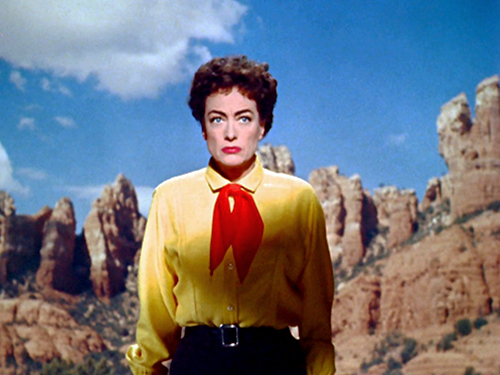
Joan Crawford stars in Johnny Guitar, as Vienna, a tough and willful owner of a remote Arizona gambling saloon who dreams of becoming rich when the new railroad comes to town. She is opposed by a local townswoman named Emma Small (played by Mercedes McCambridge) who feels threatened by the new railroad and is particularly volatile.
EN
“There was theatre (Griffith), poetry (Murnau), painting (Rossellini), dance (Eisenstein), music (Renoir). Henceforward there is cinema. And the cinema is Nicholas Ray.”
Jean-Luc Godard
“Just as with very big things, you do not explain Johnny Guitar. You tell it (see it) again, again and again, like stories are told to children, until everything is known by heart and you learn that everything in them is right. It is The Imitation of Christ of cinephiles. You can open it anywhere and you’ll find the right sentence. You can watch it for the sixty-eighth time and you’ll find the right answer to what you are living.”
João Bénard da Costa1
“This baroque and deliriously stylised Western, along with Fritz Lang’s Rancho Notorious and Raoul Walsh’s Pursued, proves it is possible to lift the genre into the realms of Freudian analysis, political polemic and even Greek tragedy. (...)
On the political level, which was more important then than now, the film is a brave indictment of the McCarthyite bigotry that swept America during the fifties - ‘an impression of the present,’ one American critic wrote at the time, ‘filmed through the myths of the past’.
No movie is unrelated to the time in which it was made and every film changes when viewed from a different time. So perhaps the most affecting feature of the film now is it’s deep romanticism. Johnny, who no longer carries a gun, is still in love with Vienna. But she is now an independent woman in control of her own destiny. If he wants her back, he’s going to have to take her on her own terms. Even as he saves her from her rabid, almost pathological enemies, he knows that.”
Derek Malcolm2
François Truffaut once wrote that Johnny Guitar “is the Beauty and the Beast of westerns, a western dream,” but I prefer to think of it as a few degrees closer to Orpheus: still a dream, but at heart more myth than fairy tale. You may recall that Orpheus was an ancient Greek musician who attempted to liberate his wife, Eurydice, from eternal damnation, armed only with a lyre and a keen ear for melody, and who was welcome to return from the underworld, wife in tow, on the condition that he never look at her again (spoiler: he snuck a peek and failed). And you may recall, too, that a crucial early sequence in Johnny Guitar finds the titular musician (Sterling Hayden) interrupting a showdown between former flame Vienna (Joan Crawford) and a posse of seething lawmen and townspeople with nothing more than his six-string namesake and an Orphic tune. The twist here is that nobody can look at anybody: Desire destroys everyone and everything, each glance shared a chance for death. Not even Hades was so cruel.
Calum Marsh3
Johnny: How many men have you forgotten?
Vienna: As many women as you’ve remembered.
Don’t go away.
I haven’t moved.
Tell me something nice.
Sure. What do you want to hear?
Lie to me. Tell me all these years you’ve waited...
All these years I’ve waited.
Tell me you’d have died if I hadn’t come back.
I would have died if you hadn’t come back.
Tell me you still love me like I love you.
I still love you like you love me.
Thanks. Thanks a lot.
- 1João Bénard da Costa, “Johnny Guitar,” À pala de Walsh, 14 June 2014.
- 2Derek Malcolm, “Nicholas Ray: Johnny Guitar,” (The Guardian, 1999).
- 3Calum Marsh, “Johnny Guitar,” (Slant Magazine, 2015).

